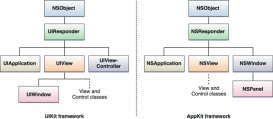在ios中使用rsa加密解密,需要用到.der和.p12后缀格式的文件,其中.der格式的文件存放的是公钥(public key)用于加密,.p12格式的文件存放的是私钥(private key)用于解密. 首先需要先生成这些文件,然后再将文件导入工程使用,不多说,开始做!
一、使用openssl生成所需秘钥文件
生成环境是在mac系统下,使用openssl进行生成,首先打开终端,按下面这些步骤依次来做:
1. 生成模长为1024bit的私钥文件private_key.pem
openssl genrsa -out private_key.pem 1024
2. 生成证书请求文件rsacertreq.csr
openssl req -new -key private_key.pem -out rsacerreq.csr
注意:这一步会提示输入国家、省份、mail等信息,可以根据实际情况填写,或者全部不用填写,直接全部敲回车.
3. 生成证书rsacert.crt,并设置有效时间为1年
openssl x509 -req -days 3650 -in rsacerreq.csr -signkey private_key.pem -out rsacert.crt
4. 生成供ios使用的公钥文件public_key.der
openssl x509 -outform der -in rsacert.crt -out public_key.der
5. 生成供ios使用的私钥文件private_key.p12
openssl pkcs12 -export -out private_key.p12 -inkey private_key.pem -in rsacert.crt
注意:这一步会提示给私钥文件设置密码,直接输入想要设置密码即可,然后敲回车,然后再验证刚才设置的密码,再次输入密码,然后敲回车,完毕!
在解密时,private_key.p12文件需要和这里设置的密码配合使用,因此需要牢记此密码.
6. 生成供java使用的公钥rsa_public_key.pem
openssl rsa -in private_key.pem -out rsa_public_key.pem -pubout
7. 生成供java使用的私钥pkcs8_private_key.pem
openssl pkcs8 -topk8 -in private_key.pem -out pkcs8_private_key.pem -nocrypt
全部执行成功后,会生成如下文件,其中public_key.der和private_key.p12就是ios需要用到的文件,如下图:

生成的文件
二、将文件导入工程使用
1.新建工程, 并导入security.framework框架, 如下图:

新建工程并添加框架
2.导入秘钥文件
导入.der和.p12格式的秘钥文件, 如下图:

导入秘钥文件
3.新建用于加密、解密的类rsaencryptor, 并实现相关方法
新建rsaencryptor类, 如下图:

新建用于加密解密的类
下面开始上代码, 可以直接复制过去用:
rsaencryptor.h代码如下:
|
1
2
3
4
5
6
7
8
9
10
11
12
13
14
15
16
17
18
19
20
21
22
23
24
25
26
27
28
29
30
31
32
33
34
35
36
37
38
39
40
41
42
43
44
45
46
47
48
49
50
51
52
53
54
55
56
57
58
59
60
61
62
63
64
65
66
67
68
69
70
71
72
73
74
75
76
77
78
79
80
81
82
83
84
85
86
87
88
89
90
91
92
93
94
95
96
97
98
99
100
101
102
103
104
105
106
107
108
109
110
111
112
113
114
115
116
117
118
119
120
121
122
123
124
125
126
127
128
129
130
131
132
133
134
135
136
137
138
139
140
141
142
143
144
145
146
147
148
149
150
151
152
153
154
155
156
157
158
159
160
161
162
163
164
165
166
167
168
169
170
171
172
173
174
175
176
177
178
179
180
181
182
183
184
185
186
187
188
189
190
191
192
193
194
195
196
197
198
199
200
201
202
203
204
205
206
207
208
209
210
211
212
213
214
215
216
217
218
219
220
221
222
223
224
225
226
227
228
229
230
231
232
233
234
235
236
237
238
239
240
241
242
243
244
245
246
247
248
249
250
251
252
253
254
255
256
257
258
259
260
261
262
263
264
265
266
267
268
269
270
271
272
273
274
275
276
277
278
279
280
281
282
283
284
285
286
287
288
289
290
291
292
293
294
295
296
297
298
299
300
301
302
303
304
305
306
307
308
309
310
311
312
313
314
315
316
317
318
319
320
321
322
323
324
325
326
327
328
329
330
331
332
333
334
335
336
337
338
339
340
341
342
343
344
345
346
347
348
349
350
351
352
353
354
355
356
357
358
359
360
361
362
363
364
365
366
367
368
369
370
371
372
373
374
375
376
377
378
379
380
381
382
383
384
385
386
387
388
389
390
391
392
393
394
395
396
397
398
399
400
401
402
403
404
405
406
407
408
409
410
411
|
#import <foundation/foundation.h>@interface rsaencryptor : nsobject/** * 加密方法 * * @param str 需要加密的字符串 * @param path '.der'格式的公钥文件路径 */+ (nsstring *)encryptstring:(nsstring *)str publickeywithcontentsoffile:(nsstring *)path;/** * 解密方法 * * @param str 需要解密的字符串 * @param path '.p12'格式的私钥文件路径 * @param password 私钥文件密码 */+ (nsstring *)decryptstring:(nsstring *)str privatekeywithcontentsoffile:(nsstring *)path password:(nsstring *)password;/** * 加密方法 * * @param str 需要加密的字符串 * @param pubkey 公钥字符串 */+ (nsstring *)encryptstring:(nsstring *)str publickey:(nsstring *)pubkey;/** * 解密方法 * * @param str 需要解密的字符串 * @param privkey 私钥字符串 */+ (nsstring *)decryptstring:(nsstring *)str privatekey:(nsstring *)privkey;@endrsaencryptor.m代码如下:#import "rsaencryptor.h"#import <security/security.h>@implementation rsaencryptorstatic nsstring *base64_encode_data(nsdata *data){ data = [data base64encodeddatawithoptions:0]; nsstring *ret = [[nsstring alloc] initwithdata:data encoding:nsutf8stringencoding]; return ret;}static nsdata *base64_decode(nsstring *str){ nsdata *data = [[nsdata alloc] initwithbase64encodedstring:str options:nsdatabase64decodingignoreunknowncharacters]; return data;}#pragma mark - 使用'.der'公钥文件加密//加密+ (nsstring *)encryptstring:(nsstring *)str publickeywithcontentsoffile:(nsstring *)path{ if (!str || !path) return nil; return [self encryptstring:str publickeyref:[self getpublickeyrefwithcontentsoffile:path]];}//获取公钥+ (seckeyref)getpublickeyrefwithcontentsoffile:(nsstring *)filepath{ nsdata *certdata = [nsdata datawithcontentsoffile:filepath]; if (!certdata) { return nil; } seccertificateref cert = seccertificatecreatewithdata(null, (cfdataref)certdata); seckeyref key = null; sectrustref trust = null; secpolicyref policy = null; if (cert != null) { policy = secpolicycreatebasicx509(); if (policy) { if (sectrustcreatewithcertificates((cftyperef)cert, policy, &trust) == noerr) { sectrustresulttype result; if (sectrustevaluate(trust, &result) == noerr) { key = sectrustcopypublickey(trust); } } } } if (policy) cfrelease(policy); if (trust) cfrelease(trust); if (cert) cfrelease(cert); return key;}+ (nsstring *)encryptstring:(nsstring *)str publickeyref:(seckeyref)publickeyref{ if(![str datausingencoding:nsutf8stringencoding]){ return nil; } if(!publickeyref){ return nil; } nsdata *data = [self encryptdata:[str datausingencoding:nsutf8stringencoding] withkeyref:publickeyref]; nsstring *ret = base64_encode_data(data); return ret;}#pragma mark - 使用'.12'私钥文件解密//解密+ (nsstring *)decryptstring:(nsstring *)str privatekeywithcontentsoffile:(nsstring *)path password:(nsstring *)password{ if (!str || !path) return nil; if (!password) password = @""; return [self decryptstring:str privatekeyref:[self getprivatekeyrefwithcontentsoffile:path password:password]];}//获取私钥+ (seckeyref)getprivatekeyrefwithcontentsoffile:(nsstring *)filepath password:(nsstring*)password{ nsdata *p12data = [nsdata datawithcontentsoffile:filepath]; if (!p12data) { return nil; } seckeyref privatekeyref = null; nsmutabledictionary * options = [[nsmutabledictionary alloc] init]; [options setobject: password forkey:(__bridge id)ksecimportexportpassphrase]; cfarrayref items = cfarraycreate(null, 0, 0, null); osstatus securityerror = secpkcs12import((__bridge cfdataref) p12data, (__bridge cfdictionaryref)options, &items); if (securityerror == noerr && cfarraygetcount(items) > 0) { cfdictionaryref identitydict = cfarraygetvalueatindex(items, 0); secidentityref identityapp = (secidentityref)cfdictionarygetvalue(identitydict, ksecimportitemidentity); securityerror = secidentitycopyprivatekey(identityapp, &privatekeyref); if (securityerror != noerr) { privatekeyref = null; } } cfrelease(items); return privatekeyref;}+ (nsstring *)decryptstring:(nsstring *)str privatekeyref:(seckeyref)privkeyref{ nsdata *data = [[nsdata alloc] initwithbase64encodedstring:str options:nsdatabase64decodingignoreunknowncharacters]; if (!privkeyref) { return nil; } data = [self decryptdata:data withkeyref:privkeyref]; nsstring *ret = [[nsstring alloc] initwithdata:data encoding:nsutf8stringencoding]; return ret;}#pragma mark - 使用公钥字符串加密/* start: encryption with rsa public key *///使用公钥字符串加密+ (nsstring *)encryptstring:(nsstring *)str publickey:(nsstring *)pubkey{ nsdata *data = [self encryptdata:[str datausingencoding:nsutf8stringencoding] publickey:pubkey]; nsstring *ret = base64_encode_data(data); return ret;}+ (nsdata *)encryptdata:(nsdata *)data publickey:(nsstring *)pubkey{ if(!data || !pubkey){ return nil; } seckeyref keyref = [self addpublickey:pubkey]; if(!keyref){ return nil; } return [self encryptdata:data withkeyref:keyref];}+ (seckeyref)addpublickey:(nsstring *)key{ nsrange spos = [key rangeofstring:@"-----begin public key-----"]; nsrange epos = [key rangeofstring:@"-----end public key-----"]; if(spos.location != nsnotfound && epos.location != nsnotfound){ nsuinteger s = spos.location + spos.length; nsuinteger e = epos.location; nsrange range = nsmakerange(s, e-s); key = [key substringwithrange:range]; } key = [key stringbyreplacingoccurrencesofstring:@"\r" withstring:@""]; key = [key stringbyreplacingoccurrencesofstring:@"\n" withstring:@""]; key = [key stringbyreplacingoccurrencesofstring:@"\t" withstring:@""]; key = [key stringbyreplacingoccurrencesofstring:@" " withstring:@""]; // this will be base64 encoded, decode it. nsdata *data = base64_decode(key); data = [self strippublickeyheader:data]; if(!data){ return nil; } //a tag to read/write keychain storage nsstring *tag = @"rsautil_pubkey"; nsdata *d_tag = [nsdata datawithbytes:[tag utf8string] length:[tag length]]; // delete any old lingering key with the same tag nsmutabledictionary *publickey = [[nsmutabledictionary alloc] init]; [publickey setobject:(__bridge id) ksecclasskey forkey:(__bridge id)ksecclass]; [publickey setobject:(__bridge id) ksecattrkeytypersa forkey:(__bridge id)ksecattrkeytype]; [publickey setobject:d_tag forkey:(__bridge id)ksecattrapplicationtag]; secitemdelete((__bridge cfdictionaryref)publickey); // add persistent version of the key to system keychain [publickey setobject:data forkey:(__bridge id)ksecvaluedata]; [publickey setobject:(__bridge id) ksecattrkeyclasspublic forkey:(__bridge id) ksecattrkeyclass]; [publickey setobject:[nsnumber numberwithbool:yes] forkey:(__bridge id) ksecreturnpersistentref]; cftyperef persistkey = nil; osstatus status = secitemadd((__bridge cfdictionaryref)publickey, &persistkey); if (persistkey != nil){ cfrelease(persistkey); } if ((status != noerr) && (status != errsecduplicateitem)) { return nil; } [publickey removeobjectforkey:(__bridge id)ksecvaluedata]; [publickey removeobjectforkey:(__bridge id)ksecreturnpersistentref]; [publickey setobject:[nsnumber numberwithbool:yes] forkey:(__bridge id)ksecreturnref]; [publickey setobject:(__bridge id) ksecattrkeytypersa forkey:(__bridge id)ksecattrkeytype]; // now fetch the seckeyref version of the key seckeyref keyref = nil; status = secitemcopymatching((__bridge cfdictionaryref)publickey, (cftyperef *)&keyref); if(status != noerr){ return nil; } return keyref;}+ (nsdata *)strippublickeyheader:(nsdata *)d_key{ // skip asn.1 public key header if (d_key == nil) return(nil); unsigned long len = [d_key length]; if (!len) return(nil); unsigned char *c_key = (unsigned char *)[d_key bytes]; unsigned int idx = 0; if (c_key[idx++] != 0x30) return(nil); if (c_key[idx] > 0x80) idx += c_key[idx] - 0x80 + 1; else idx++; // pkcs #1 rsaencryption szoid_rsa_rsa static unsigned char seqiod[] = { 0x30, 0x0d, 0x06, 0x09, 0x2a, 0x86, 0x48, 0x86, 0xf7, 0x0d, 0x01, 0x01, 0x01, 0x05, 0x00 }; if (memcmp(&c_key[idx], seqiod, 15)) return(nil); idx += 15; if (c_key[idx++] != 0x03) return(nil); if (c_key[idx] > 0x80) idx += c_key[idx] - 0x80 + 1; else idx++; if (c_key[idx++] != '\0') return(nil); // now make a new nsdata from this buffer return ([nsdata datawithbytes:&c_key[idx] length:len - idx]);}+ (nsdata *)encryptdata:(nsdata *)data withkeyref:(seckeyref) keyref{ const uint8_t *srcbuf = (const uint8_t *)[data bytes]; size_t srclen = (size_t)data.length; size_t block_size = seckeygetblocksize(keyref) * sizeof(uint8_t); void *outbuf = malloc(block_size); size_t src_block_size = block_size - 11; nsmutabledata *ret = [[nsmutabledata alloc] init]; for(int idx=0; idx<srclen; idx+=src_block_size){ //nslog(@"%d/%d block_size: %d", idx, (int)srclen, (int)block_size); size_t data_len = srclen - idx; if(data_len > src_block_size){ data_len = src_block_size; } size_t outlen = block_size; osstatus status = noerr; status = seckeyencrypt(keyref, ksecpaddingpkcs1, srcbuf + idx, data_len, outbuf, &outlen ); if (status != 0) { nslog(@"seckeyencrypt fail. error code: %d", status); ret = nil; break; }else{ [ret appendbytes:outbuf length:outlen]; } } free(outbuf); cfrelease(keyref); return ret;}/* end: encryption with rsa public key */#pragma mark - 使用私钥字符串解密/* start: decryption with rsa private key *///使用私钥字符串解密+ (nsstring *)decryptstring:(nsstring *)str privatekey:(nsstring *)privkey{ if (!str) return nil; nsdata *data = [[nsdata alloc] initwithbase64encodedstring:str options:nsdatabase64decodingignoreunknowncharacters]; data = [self decryptdata:data privatekey:privkey]; nsstring *ret = [[nsstring alloc] initwithdata:data encoding:nsutf8stringencoding]; return ret;}+ (nsdata *)decryptdata:(nsdata *)data privatekey:(nsstring *)privkey{ if(!data || !privkey){ return nil; } seckeyref keyref = [self addprivatekey:privkey]; if(!keyref){ return nil; } return [self decryptdata:data withkeyref:keyref];}+ (seckeyref)addprivatekey:(nsstring *)key{ nsrange spos = [key rangeofstring:@"-----begin rsa private key-----"]; nsrange epos = [key rangeofstring:@"-----end rsa private key-----"]; if(spos.location != nsnotfound && epos.location != nsnotfound){ nsuinteger s = spos.location + spos.length; nsuinteger e = epos.location; nsrange range = nsmakerange(s, e-s); key = [key substringwithrange:range]; } key = [key stringbyreplacingoccurrencesofstring:@"\r" withstring:@""]; key = [key stringbyreplacingoccurrencesofstring:@"\n" withstring:@""]; key = [key stringbyreplacingoccurrencesofstring:@"\t" withstring:@""]; key = [key stringbyreplacingoccurrencesofstring:@" " withstring:@""]; // this will be base64 encoded, decode it. nsdata *data = base64_decode(key); data = [self stripprivatekeyheader:data]; if(!data){ return nil; } //a tag to read/write keychain storage nsstring *tag = @"rsautil_privkey"; nsdata *d_tag = [nsdata datawithbytes:[tag utf8string] length:[tag length]]; // delete any old lingering key with the same tag nsmutabledictionary *privatekey = [[nsmutabledictionary alloc] init]; [privatekey setobject:(__bridge id) ksecclasskey forkey:(__bridge id)ksecclass]; [privatekey setobject:(__bridge id) ksecattrkeytypersa forkey:(__bridge id)ksecattrkeytype]; [privatekey setobject:d_tag forkey:(__bridge id)ksecattrapplicationtag]; secitemdelete((__bridge cfdictionaryref)privatekey); // add persistent version of the key to system keychain [privatekey setobject:data forkey:(__bridge id)ksecvaluedata]; [privatekey setobject:(__bridge id) ksecattrkeyclassprivate forkey:(__bridge id) ksecattrkeyclass]; [privatekey setobject:[nsnumber numberwithbool:yes] forkey:(__bridge id) ksecreturnpersistentref]; cftyperef persistkey = nil; osstatus status = secitemadd((__bridge cfdictionaryref)privatekey, &persistkey); if (persistkey != nil){ cfrelease(persistkey); } if ((status != noerr) && (status != errsecduplicateitem)) { return nil; } [privatekey removeobjectforkey:(__bridge id)ksecvaluedata]; [privatekey removeobjectforkey:(__bridge id)ksecreturnpersistentref]; [privatekey setobject:[nsnumber numberwithbool:yes] forkey:(__bridge id)ksecreturnref]; [privatekey setobject:(__bridge id) ksecattrkeytypersa forkey:(__bridge id)ksecattrkeytype]; // now fetch the seckeyref version of the key seckeyref keyref = nil; status = secitemcopymatching((__bridge cfdictionaryref)privatekey, (cftyperef *)&keyref); if(status != noerr){ return nil; } return keyref;}+ (nsdata *)stripprivatekeyheader:(nsdata *)d_key{ // skip asn.1 private key header if (d_key == nil) return(nil); unsigned long len = [d_key length]; if (!len) return(nil); unsigned char *c_key = (unsigned char *)[d_key bytes]; unsigned int idx = 22; //magic byte at offset 22 if (0x04 != c_key[idx++]) return nil; //calculate length of the key unsigned int c_len = c_key[idx++]; int det = c_len & 0x80; if (!det) { c_len = c_len & 0x7f; } else { int bytecount = c_len & 0x7f; if (bytecount + idx > len) { //rsa length field longer than buffer return nil; } unsigned int accum = 0; unsigned char *ptr = &c_key[idx]; idx += bytecount; while (bytecount) { accum = (accum << 8) + *ptr; ptr++; bytecount--; } c_len = accum; } // now make a new nsdata from this buffer return [d_key subdatawithrange:nsmakerange(idx, c_len)];}+ (nsdata *)decryptdata:(nsdata *)data withkeyref:(seckeyref) keyref{ const uint8_t *srcbuf = (const uint8_t *)[data bytes]; size_t srclen = (size_t)data.length; size_t block_size = seckeygetblocksize(keyref) * sizeof(uint8_t); uint8 *outbuf = malloc(block_size); size_t src_block_size = block_size; nsmutabledata *ret = [[nsmutabledata alloc] init]; for(int idx=0; idx<srclen; idx+=src_block_size){ //nslog(@"%d/%d block_size: %d", idx, (int)srclen, (int)block_size); size_t data_len = srclen - idx; if(data_len > src_block_size){ data_len = src_block_size; } size_t outlen = block_size; osstatus status = noerr; status = seckeydecrypt(keyref, ksecpaddingnone, srcbuf + idx, data_len, outbuf, &outlen ); if (status != 0) { nslog(@"seckeyencrypt fail. error code: %d", status); ret = nil; break; }else{ //the actual decrypted data is in the middle, locate it! int idxfirstzero = -1; int idxnextzero = (int)outlen; for ( int i = 0; i < outlen; i++ ) { if ( outbuf[i] == 0 ) { if ( idxfirstzero < 0 ) { idxfirstzero = i; } else { idxnextzero = i; break; } } } [ret appendbytes:&outbuf[idxfirstzero+1] length:idxnextzero-idxfirstzero-1]; } } free(outbuf); cfrelease(keyref); return ret;}/* end: decryption with rsa private key */@end |
4. 测试加密、解密
首先先测试使用.der和.p12秘钥文件进行加密、解密, 在viewcontroller.m中进行测试, 代码如下:
|
1
2
3
4
5
6
7
8
9
10
11
12
13
14
15
16
17
18
19
20
21
22
23
|
#import "viewcontroller.h"#import "rsaencryptor.h"@interface viewcontroller ()@end@implementation viewcontroller- (void)viewdidload { [super viewdidload]; //原始数据 nsstring *originalstring = @"这是一段将要使用'.der'文件加密的字符串!"; //使用.der和.p12中的公钥私钥加密解密 nsstring *public_key_path = [[nsbundle mainbundle] pathforresource:@"public_key.der" oftype:nil]; nsstring *private_key_path = [[nsbundle mainbundle] pathforresource:@"private_key.p12" oftype:nil]; nsstring *encryptstr = [rsaencryptor encryptstring:originalstring publickeywithcontentsoffile:public_key_path]; nslog(@"加密前:%@", originalstring); nslog(@"加密后:%@", encryptstr); nslog(@"解密后:%@", [rsaencryptor decryptstring:encryptstr privatekeywithcontentsoffile:private_key_path password:@"123456"]);}- (void)didreceivememorywarning { [super didreceivememorywarning]; // dispose of any resources that can be recreated.}@end |
运行后, 输出信息如下:

输出结果
可以看到已经可以成功加密、解密了.
下面接着测试使用秘钥字符串进行加密、解密, 那么秘钥字符串从哪里来? 可以来这里:http://web.chacuo.net/netrsakeypair, 这是一个在线生成rsa秘钥的网站, 生成公钥和秘钥后, 复制出来用于测试. 然后在viewcontroller.m中使用rsaentryptor.h头文件中对应的加密方法进行加密, viewcontroller.m中代码如下:
|
1
2
3
4
5
6
7
8
9
10
11
12
13
14
15
16
17
18
19
20
21
22
|
#import "viewcontroller.h"#import "rsaencryptor.h"@interface viewcontroller ()@end@implementation viewcontroller- (void)viewdidload { [super viewdidload]; //原始数据 nsstring *originalstring = @"这是一段将要使用'秘钥字符串'进行加密的字符串!"; //使用字符串格式的公钥私钥加密解密 nsstring *encryptstr = [rsaencryptor encryptstring:originalstring publickey:@"migfma0gcsqgsib3dqebaquaa4gnadcbiqkbgqdtbz6cnh9pgdf60aqkvelz3ftalyzhqwbp601y77szmghx3f5novuzbdk7umdoclk4fbzitewyd9dwvaerxzo9bfui96baop8wfl1vkzyyhtcznxnjfgsqd/b70/exmgmbpewkaadyuqijidvgh1fqk/4acws39yxwbs+ilhspsqidaqab"]; nslog(@"加密前:%@", originalstring); nslog(@"加密后:%@", encryptstr); nslog(@"解密后:%@", [rsaencryptor decryptstring:encryptstr privatekey:@"miiceaibadanbgkqhkig9w0baqefaascamiwggjeageaaogbanntnpw0f0+b0xrrpaq94vpcvnqxlmddbunrtxlvtloyydfcxk2hvrlt0rtqx2gisrguhojn7bgp0na8astdmj0ew4j3pscinzb+xvwrnlidnzofe0kuzjb38hvt8teyawgktcqab3jsoimh1uahuvar/hpzblf1hfbtl4iuew9jagmbaaecgya1tgeqmakqofga8xtwuxewdoads9k0+ekeuoxgxzqot/gyiihuiafjilfhoua1ndf/ycqag973sbtdhtfpmwqfnqq13+jaownsltjwgr7hwf7qplyw92r7cu0v7wffjqm1t/2fku9jkhfahfb7qqesmibo/vmjer9o4tex58uxdqjbao0o4lnwdvjr1gn02cqvxpotty6dgfbqdeaazf8obb6xqvcqgw/avms3bh8nvluwdq2k/xte8thxjw9ftbqtld8cqqdkunco35gaquf9bhsdzrs7no1j3vjlrm0itrepqjqtvevdxzc+1/urkwvaiigwaxjqcvfmqzscdbznhyxpz5fxakeagb3kmrkhl4ynpmkrjhw+ih+aserccsj6sjfbhx4xaakyzmbxxnchg+jb+bznz06ybfc5nlzm7y/n61o1f5/56wjbalw+zvze6ly5l34114ug04w9x0hcfgau7mijphfjgudatd/h9xfge4odmrpud3q9me9llmyk6mikpfm4c2+3dzccqqc8y37npgpnekd9smmwppsejpw41amlfckvp4da3z7g5bglmuicrva9ydaiaaydggck8lxc8k6hpkrfgyrxkrtt"]);}- (void)didreceivememorywarning { [super didreceivememorywarning]; // dispose of any resources that can be recreated.}@end |
运行后, 输出信息如下:

输出结果
可以看到,也成功加密、解密了.
至此, rsa加密演示完毕!
以上就是本文的全部内容,希望本文的内容对大家的学习或者工作能带来一定的帮助,同时也希望多多支持服务器之家!
原文链接:http://www.jianshu.com/p/74a796ec5038
















